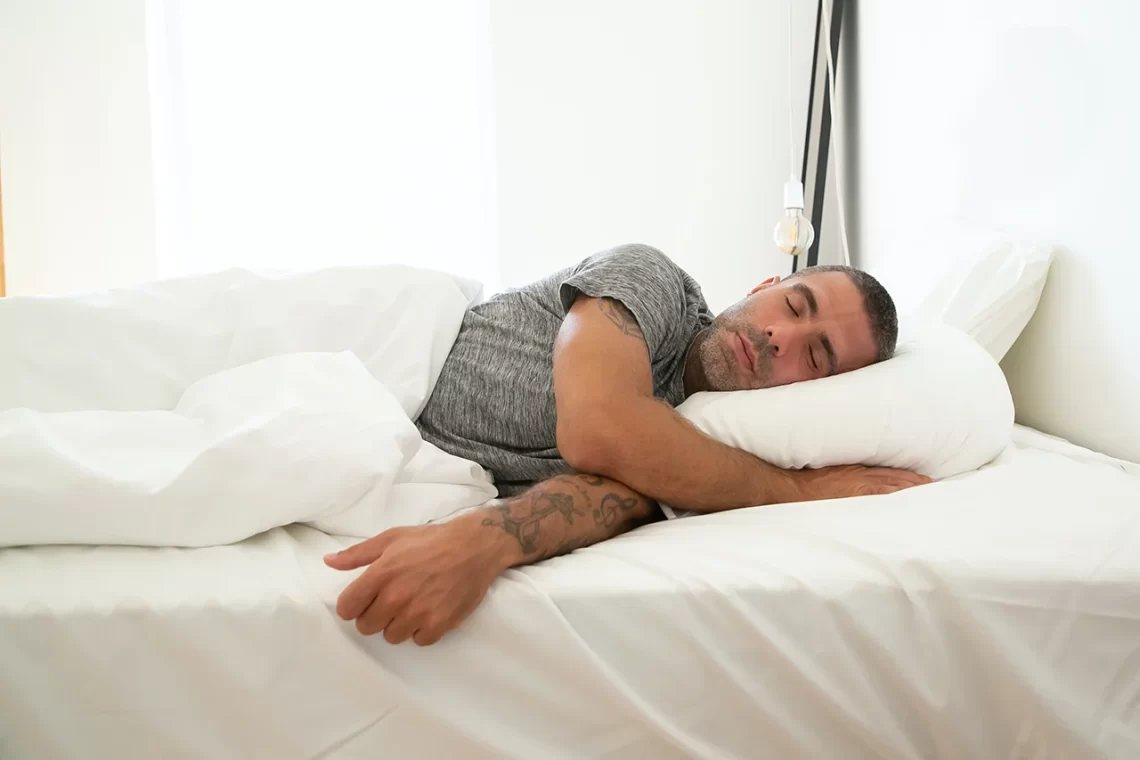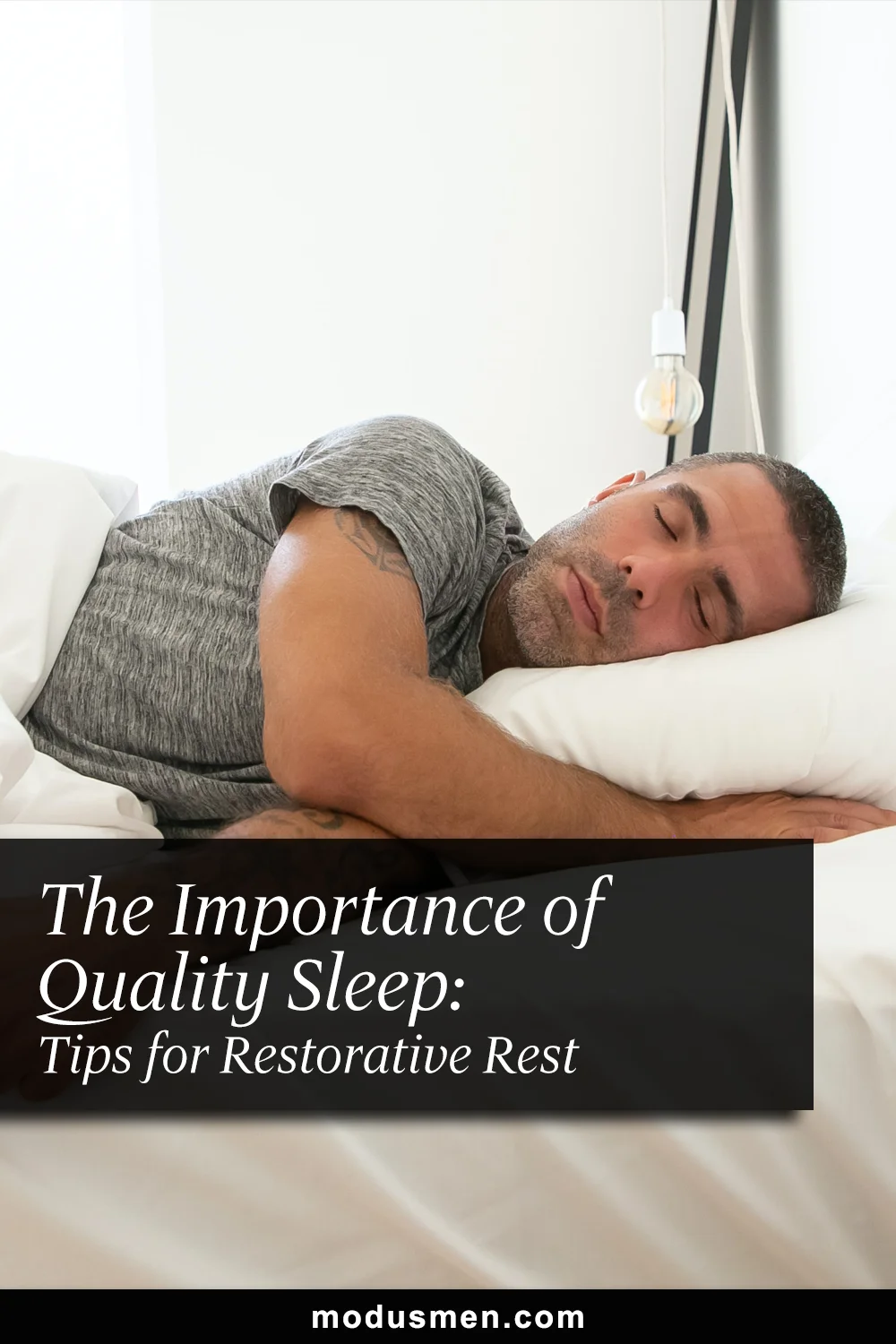
The Importance of Quality Sleep: Tips for Restorative Rest
When it comes to leading a healthy and fulfilling life, one aspect that often gets overlooked is the quality of our sleep. Sleep isn’t just a time for our bodies to rest; it’s crucial for rejuvenation, recovery, and overall well-being. For men, especially those who work out regularly, getting enough high-quality sleep is essential to reach fitness goals. In this article, we’ll explore why quality sleep matters and share useful tips to help you get restorative rest.
The Power of Quality Sleep
Sleep is a powerful tool for our overall well-being. It’s not just about resting; it’s a dynamic process that helps our bodies and minds recharge, repair, and regenerate. During sleep, many essential functions support our physical and mental health.
One key benefit of quality sleep is its impact on cognitive function. Good sleep improves concentration, memory, and mental performance. During sleep, our brains consolidate information and memories, making it easier to learn, solve problems, and make decisions. Lack of sleep can impair cognitive abilities, making it hard to focus, pay attention, and remember things.
Sleep is also vital for physical restoration. During sleep, our bodies release growth hormone, which is essential for muscle growth, tissue repair, and overall recovery. High-quality sleep promotes faster healing, boosts the immune system, and supports heart health. Lack of sleep can increase the risk of health issues like obesity, diabetes, heart disease, and mental health problems.
Moreover, sleep plays a crucial role in regulating our mood and emotional well-being. Good sleep helps us manage stress, handle challenges, and maintain a positive outlook. Not getting enough sleep can lead to irritability, mood swings, and emotional reactivity.
Recognizing the power of sleep is essential for prioritizing it in our daily lives. By understanding its impact on cognitive function, physical restoration, and emotional well-being, we can make better choices to improve our sleep habits. Creating a good sleep environment, following a consistent sleep schedule, and practicing relaxation techniques are some strategies to optimize sleep and unlock its full potential.
The Importance of Quality Sleep for Fitness Enthusiasts
For men dedicated to their fitness journeys, prioritizing quality sleep is crucial for achieving top performance and getting the most out of their efforts. Sleep plays a key role in training, recovery, and overall athletic performance.
When you work out intensely, your body undergoes physical stress and muscle breakdown. Sleep is when recovery happens. It promotes muscle repair, growth, and adaptation, making your body stronger and more resilient. During deep sleep, growth hormone is released, which helps with muscle synthesis and repair.
Sleep is also linked to energy levels and performance. Lack of quality sleep can lead to decreased stamina, reduced endurance, and impaired cognitive function. It can affect focus, coordination, reaction time, and decision-making, which can hurt your workout performance and increase injury risk.
Additionally, sleep affects hormone regulation, especially those related to appetite and metabolism. Not enough sleep can disrupt hunger hormones, leading to cravings and overeating. This can sabotage fitness goals and affect weight management. On the other hand, getting enough sleep helps maintain a healthy hormonal balance, supporting weight management and muscle-building.
The Magic Number: Eight Hours of Quality Sleep
For adults, including men working out and aiming for fitness goals, the general recommendation is around eight hours of quality sleep per night. This “magic number” allows the body to undergo essential restorative processes for physical and mental well-being.
During sleep, the body repairs tissues, synthesizes proteins, and releases growth hormones crucial for muscle recovery and growth. Getting a solid eight hours of sleep gives your body enough time to complete these processes effectively. It ensures your muscles get the necessary repair, helping you maximize workout benefits and progress towards fitness goals.
Beyond muscle recovery, sufficient sleep supports immune function, also enhances cognitive abilities like memory and problem-solving, and helps regulate hormones involved in appetite and metabolism. All these factors contribute to better overall well-being, allowing you to perform at your best in and out of the gym.
Remember, while eight hours is a general guideline, individual sleep needs may vary. Some people might need slightly more or less sleep to feel rested. Pay attention to your body’s signals and adjust your sleep duration accordingly.
Tips for Restorative Rest
Establish a Consistent Sleep Schedule
One of the best ways to improve your sleep quality is by setting a consistent sleep schedule. Our bodies love routine, and keeping a regular sleep-wake cycle helps sync our internal clock, known as the circadian rhythm. Here’s why and how you can find your sleep rhythm:
- Why It Matters:
Consistency in your sleep schedule helps regulate your body’s internal clock, making it easier to fall asleep and wake up refreshed. When you go to bed and wake up at the same time each day, your body gets used to a predictable pattern. - Set a Bedtime and Wake-Up Time:
Pick a bedtime and wake-up time that fits your lifestyle and allows for 7-9 hours of sleep. Be realistic about your sleep needs and choose a schedule you can stick to, even on weekends. Consistency is key. - Gradual Adjustments:
If you need to change your sleep schedule, do it gradually. Shift your bedtime and wake-up time by 15-30 minutes every few days until you reach your desired schedule. This helps your body adjust smoothly. - Avoid Oversleeping:
Sleeping in on weekends can mess up your sleep schedule. Aim for a consistent wake-up time, even on weekends, to keep your sleep rhythm steady. - Morning Light Exposure:
Get some natural sunlight or bright indoor light when you wake up. Morning light helps regulate your circadian rhythm, signaling to your body that it’s time to be awake. Open your curtains, go for a walk, or sit by a window to soak in the sunlight. - Wind-Down Routine:
Create a relaxing pre-sleep routine to signal to your body that it’s time to unwind. Activities like reading, listening to calming music, or taking a warm bath can help. A consistent wind-down routine prepares your mind and body for sleep.
Remember, finding your sleep rhythm and sticking to a consistent schedule may take time. Be patient as your body adjusts. With time, falling asleep and waking up will become easier, and you’ll enjoy the benefits of a well-regulated sleep-wake cycle.
Create a Restful Environment for Quality Sleep
Creating an environment that promotes darkness and comfort is key to a restful night’s sleep. Here are some tips to help you achieve a tranquil sleep sanctuary:
- Embrace Blackout Curtains:
Installing blackout curtains in your bedroom can block out external light sources. These curtains minimize light infiltration, creating a dark and peaceful environment that promotes better sleep. By keeping your bedroom free from unwanted light, you signal to your brain that it’s time to wind down and sleep. Amazon has a wide variety of affordable blackout curtains. - Consider a Sleep Mask:
If you struggle with light sensitivity or can’t control external light sources, a sleep mask can help. Sleep masks create a personal cocoon of darkness around your eyes, shielding them from any residual light and enhancing sleep quality. Choose a comfortable, breathable sleep mask with contoured eye cups to limit pressure on your eyes and eyelashes. Check out Amazon for a great selection of sleep masks. - Keep Your Bedroom Cool:
Temperature plays a crucial role in sleep quality. A cool and comfortable environment can help you fall asleep faster and experience fewer interruptions. Set your thermostat to a pleasantly cool temperature, and consider using a fan or air conditioner to maintain a consistent and soothing temperature in your bedroom. - Invest in a Comfortable Mattress and Pillows:
Your mattress and pillows greatly influence your sleep comfort. Opt for a high-quality mattress that provides adequate support for your body, and select pillows that suit your preferred sleeping position. This combination ensures proper spinal alignment and reduces the risk of discomfort or pain that can disrupt your sleep. - Minimize Noise Disturbances:
Noise can disrupt your sleep patterns and prevent restorative rest. Consider using earplugs or a white noise machine to drown out unwanted sounds. These tools create a soothing auditory atmosphere that promotes peaceful and uninterrupted sleep. - Create a Clutter-Free Space:
A cluttered bedroom can make it difficult to relax and fall asleep. Keep your sleep environment clean and organized, free from unnecessary clutter. Clear surfaces, minimal décor, and a soothing color scheme can help create a calm and inviting atmosphere that promotes restful sleep.
By incorporating blackout curtains, using a sleep mask, maintaining a cool temperature, investing in a comfortable mattress and pillows, minimizing noise disturbances, and creating a clutter-free space, you can transform your bedroom into a haven of tranquility. Remember, a restful environment sets the stage for a rejuvenating night’s of quality sleep, allowing you to wake up feeling refreshed and ready to tackle the day ahead.
Limit Screen Time
The blue light from electronic devices like smartphones, tablets, and TVs can mess with your body’s natural sleep processes. Disconnect from screens at least an hour before bed to let your brain produce melatonin, the sleep hormone. Instead, try screen-free activities that help you relax.
But we get it—sometimes you can’t avoid screens, especially in today’s digital world. If you need to use screens close to bedtime, here are ways to minimize blue light’s impact on your sleep:
- Utilize Night Light Settings:
Many devices, including smartphones, tablets, and computers, have a “Night Light” or “Night Shift” feature. These settings reduce blue light emission, creating a warmer, sleep-friendly screen tone. Enable this feature in the evening to help your brain wind down. - Install Blue Light Filtering Apps:
If your device doesn’t have a built-in night mode, you can use blue light filtering apps or software extensions. These tools adjust the screen color temperature to reduce blue light, making it easier on your eyes and helping you fall asleep after screen use. - Wear Blue Light Blocking Glasses:
If you can’t avoid screen time in the evening, consider wearing blue light blocking glasses. These glasses filter out blue light, reducing its impact on your sleep cycle. Put them on a couple of hours before bed to prepare your body for sleep. Amazon has many affordable options in various styles.
Remember, while these strategies can help, it’s still best to limit screen time before bed whenever possible. Engage in relaxing activities like reading a book or enjoying a calming hobby to let your mind and body unwind naturally. By being mindful of your screen usage and using these tips, you can promote better sleep hygiene and improve your chances of a restful night’s sleep.
Wind Down Before Bedtime to Ensure Quality Sleep
Creating a relaxing routine before bedtime can help you fall asleep and enjoy restorative rest. As the day ends, it’s important to give your mind and body time to wind down. Here are some tips to help you establish an effective wind-down routine:
- Read a Book or Magazine:
Reading a physical book or magazine can be a great way to unwind before sleep. Choose something enjoyable and calming, like fiction, self-help, or inspirational content. Reading distracts your mind from daily stress and helps transition your body into relaxation. - Listen to Calming Music or Audiobooks:
Soft, soothing music or audiobooks can have a calming effect. Create a playlist of relaxing tunes or listen to nature sounds, guided meditations, or bedtime stories. Let the gentle melodies wash away the day’s worries and prepare your mind for sleep. - Practice Relaxation Techniques:
Incorporate relaxation techniques into your routine to promote calmness. Deep breathing exercises, progressive muscle relaxation, or gentle stretching can help release tension and prepare your body for rest. Experiment with different techniques to find what works best for you. - Take a Warm Bath or Shower:
A warm bath or shower can relax both your mind and body. The soothing warm water helps relieve physical tension and signals to your brain that it’s time to unwind. Consider adding a few drops of lavender or chamomile essential oil for extra relaxation. - Avoid Stimulating Activities:
In the hours before bedtime, avoid activities that can rev up your mind and make it harder to fall asleep. Minimize intense exercise, exciting movies or TV shows, and stimulating conversations. Instead, choose peaceful, low-key activities that promote calm. - Sexual Activity (for some people):
You might wonder about sexual activity. While it can be enjoyable and intimate, it can also elevate your heart rate, release endorphins, and increase arousal, which might hinder winding down for sleep. However, everyone is unique. If you can easily fall asleep after sex, it shouldn’t negatively affect your sleep. For others, it might be better to engage in sexual activity a few hours before bedtime to allow time for relaxation.
By incorporating these tips into your wind-down routine, you can create a peaceful transition from the day’s busyness to a state of relaxation and readiness for sleep. Experiment with different activities to find a combination that works best for you. Remember, consistency is key, so try to establish a regular wind-down routine each night. By dedicating time to unwind before bedtime, you’ll pave the way for a more restful and rejuvenating sleep experience.
Mind Your Diet
What you eat and drink can significantly impact your sleep quality. While maintaining a balanced diet is important, there are specific considerations for promoting restful sleep. Here are some key points to help you mind your diet for better sleep:
- Timing of Meals:
Avoid heavy, large meals close to bedtime, as they can cause indigestion and discomfort, making it hard to fall asleep. Aim to have dinner a few hours before bed to allow time for digestion. If you’re hungry before sleep, opt for light, sleep-friendly snacks like a small portion of nuts, a banana, or a cup of herbal tea. - Watch Your Caffeine Intake:
Caffeine is a stimulant that can interfere with sleep. Be mindful of your caffeine consumption, especially in the afternoon and evening. Avoid or limit caffeinated beverages like coffee, tea, and energy drinks, as well as chocolate and certain medications that contain caffeine. Opt for decaffeinated versions or herbal tea instead. - Alcohol and Sleep:
While alcohol may make you feel drowsy initially, it can disrupt sleep quality. It interferes with natural sleep cycles, leading to fragmented and less restorative sleep. If you choose to drink alcohol, do so in moderation and finish a few hours before bedtime to allow your body time to metabolize it. - Sleep-Friendly Snacks:
Some foods can promote sleep due to their natural sleep-inducing properties. Foods rich in tryptophan, like turkey, chicken, nuts, and seeds, can help increase serotonin levels, a precursor to melatonin, the sleep hormone. Other sleep-friendly snacks include tart cherries, which are a natural source of melatonin, and a small glass of warm milk, which contains tryptophan. - Hydration:
Stay hydrated throughout the day, but be mindful of your fluid intake in the hours leading up to bedtime to minimize nighttime trips to the bathroom. Balance your hydration needs by drinking enough water during the day and tapering off closer to bedtime.
Remember, individual tolerances to certain foods and drinks may vary, so pay attention to how your body responds. If you notice that certain foods or drinks negatively impact your sleep, make adjustments to find what works best for you. By mindfully selecting sleep-friendly foods and being conscious of your timing, you can support a restful night’s sleep and wake up feeling refreshed.
Regular Exercise and Quality Sleep
Engaging in regular exercise can positively impact your sleep quality. Physical activity promotes better sleep by improving sleep duration, efficiency, and overall satisfaction. Here’s how regular exercise can contribute to a restful night’s sleep:
- Timing of Exercise:
While exercise is beneficial for sleep, the timing of your workouts matters. Avoid exercising too close to bedtime, as increased body temperature and elevated heart rate can make it hard to fall asleep. Aim to finish your workout at least a few hours before bed to allow your body to cool down and prepare for sleep. - Improved Sleep Duration:
Regular exercise is linked to longer sleep durations. Engaging in moderate-intensity aerobic exercise or strength training during the day can promote deeper and more restorative sleep, helping you wake up refreshed and rejuvenated. - Sleep Efficiency and Quality:
Exercise can enhance sleep efficiency, which is the percentage of time spent asleep compared to the time spent in bed. Regular physical activity can reduce the time it takes to fall asleep, minimize nighttime awakenings, and improve overall sleep quality. - Reduced Anxiety and Stress:
Exercise reduces anxiety and stress levels, which can significantly impact sleep quality. By incorporating regular exercise into your routine, you can manage stress, alleviate anxiety, and promote a calmer state of mind, making it easier to fall asleep and enjoy peaceful sleep. - Physical Comfort and Pain Relief:
Regular exercise improves overall physical health, strengthens muscles, and alleviates bodily discomfort. By addressing potential sources of physical discomfort through exercise, you can reduce pain that may interfere with your ability to fall asleep and stay asleep. - Establishing a Routine:
IIncorporating exercise into your daily routine can help establish a consistent sleep-wake cycle. Engaging in physical activity at similar times each day can train your body to expect sleep at a specific time, promoting a more regular and restful sleep pattern.
It’s important to listen to your body and avoid overexertion or vigorous workouts too close to bedtime. Everyone’s response to exercise may vary, so find the exercise intensity and duration that works best for you.
Before starting any exercise routine, especially for improving quality sleep, consult with your doctor or a healthcare professional, especially if you have any underlying health concerns or persistent sleep difficulties.
By embracing regular exercise as part of your lifestyle, you can enjoy improved sleep quality. So lace up your sneakers, find activities you enjoy, and start your journey towards better sleep and overall well-being.
Understanding the Downsides of Sleep Aids
While quality sleep is crucial for our well-being, sometimes we face difficulties falling or staying asleep. Sleep aids might seem like a tempting solution, but it’s important to approach their use with caution. Here are some potential pitfalls of prescription medications, over-the-counter sleep aids, and herbal supplements:
Prescription Sleep Medications
Prescription sleep medications are usually for severe sleep disorders and should be used under a healthcare professional’s guidance. Some potential pitfalls include:
- Dependency: Some prescription sleep medications can become habit-forming, leading to dependence and withdrawal symptoms if stopped abruptly.
- Side Effects: Common side effects include dizziness, daytime drowsiness, memory problems, and impaired coordination, which can impact daily functioning.
- Drug Interactions: Certain medications and health conditions may interact negatively with prescription sleep aids, leading to complications. Always disclose your complete medical history and current medications to your healthcare provider.
Over-the-Counter (OTC) Sleep Aids
OTC sleep aids are convenient but have potential pitfalls:
- Lack of Regulation: OTC sleep aids are not as closely regulated as prescription medications, so their safety and effectiveness may not be rigorously tested.
- Sedative Hangover: Some OTC sleep aids contain sedating antihistamines that can leave you feeling groggy and drowsy the next day, affecting alertness and cognitive function.
- Tolerance and Dependency: Regular or prolonged use of OTC sleep aids can lead to decreased effectiveness over time and potential dependency issues.
Herbal Supplements
Herbal supplements like valerian root, chamomile, and melatonin are often marketed as natural sleep aids. However, be aware of these pitfalls:
- Interactions and Side Effects: Herbal supplements can interact with prescription medications or cause side effects in some individuals. Consult with a healthcare professional before combining herbal supplements with other medications.
- Lack of Standardization: Herbal supplements are not regulated as strictly as medications, leading to variations in quality, potency, and safety across different brands.
- Limited Scientific Evidence: While some herbal supplements show promise in improving sleep quality, the scientific evidence supporting their effectiveness is often limited. Approach these supplements with realistic expectations.
Making Informed Choices About Sleep Aids
While sleep aids may provide temporary relief for individuals struggling with sleep issues, it is crucial to approach their use with caution. Prescription sleep medications, OTC sleep aids, and herbal supplements all carry potential pitfalls, including dependency, side effects, lack of regulation, and limited scientific evidence. It is advisable to consult with a healthcare professional before considering the use of sleep aids, as they can provide personalized guidance and help identify the underlying causes of sleep difficulties. Prioritizing healthy sleep habits, creating a conducive sleep environment, and practicing relaxation techniques are also important steps to promote restful sleep naturally
Unlocking the Benefits of Quality Sleep
Achieving quality sleep is essential for overall well-being, especially for men striving to improve their lifestyle and reach their fitness goals. By understanding the importance of sleep and implementing practical tips, you can enhance your sleep quality and enjoy the benefits of restorative rest. Establishing a consistent sleep schedule, creating a conducive sleep environment, limiting screen time, and incorporating regular exercise are all key steps to promote better sleep.
Remember, while sleep aids might offer temporary relief, it’s crucial to approach them with caution and seek professional advice. Prioritizing healthy sleep habits and making informed choices will help you unlock the full potential of quality sleep, leading to improved physical health, mental clarity, and emotional well-being. Embrace these strategies and make sleep a priority in your journey towards a healthier, more fulfilling life.






